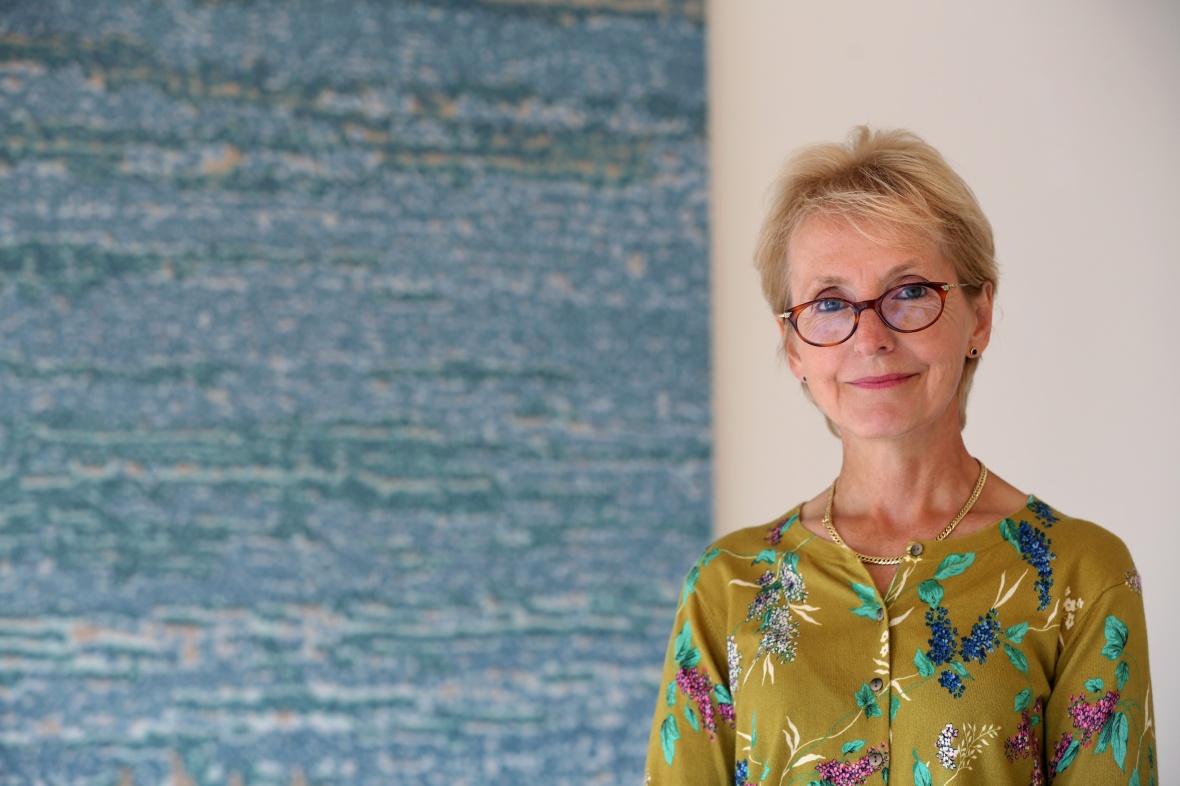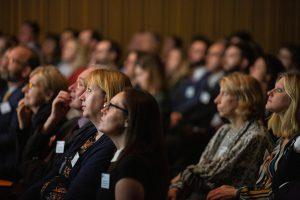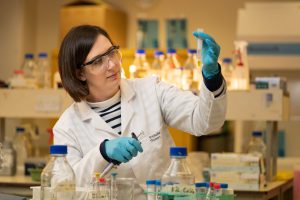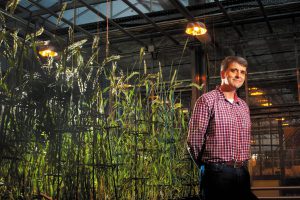
November 28, 2019, by Rob Ounsworth
Our world-leading research: an update from Professor Dame Jessica Corner
Professor Dame Jessica Corner, Pro-Vice-Chancellor for Research and Knowledge Exchange, updates on recent progress supporting the University’s mission of delivering world-leading research that transforms lives.
We are moving from shaping and implementing our research strategy to an emphasis on the delivery of our goals, as we further align with the University’s new strategy. The new year brings new opportunities and further challenges as we approach the final preparations of our submission to REF2021, support and grow our portfolio of Interdisciplinary Research Clusters (IRCs), continue to establish and invest in our Beacons of Excellence programme, and attract research leaders of tomorrow to our University.
I would like to share with you news of these and other programmes that are helping the University remain agile in our responses to emerging challenges, while also celebrating our successes:
Institute for Policy and Engagement
The University’s Institute for Policy and Engagement was officially launched in London on 28 October, where President and Vice-Chancellor Professor Shearer West welcomed more than 140 guests, including leading policymakers, representatives from industry, funding bodies and community and national organisations. Discussions focused on how the Institute is supporting the exchange of knowledge and ideas to enrich policy making, inspire people, support communities, transform lives and shape the future.
The latest edition of our research and knowledge exchange magazine, Vision, launched at the Institute event, and highlighted how our researchers are having a direct impact on policy, from helping the UK plan for a post-Brexit future and protecting young people online to making our roads safer.
External Research Advisory Group
This group is made of influential leaders and innovative thinkers from higher education, industry and wider society, who are invited to review and inform the strategic direction of our research strategy. The inaugural meeting on 28 October (complementing the Institute’s launch later that day) discussed the future of UK research funding and asked what the University of Nottingham can do to position itself to anticipate trends and changes in the future research funding system.
REF2021
We are approaching the final stages of preparations for REF2021 and will take stock of our submission in the new year. While there remains a tremendous amount to do I believe we are better prepared than ever.
Our REF results are worth around £50 million a year in funding to the University and directly feed into our reputation as a University that delivers world-leading research. All this work requires a daunting amount of data, evidence-gathering, rigorous assessment and forensic attention to detail. I am hugely grateful to REF coordinators and all colleagues who are working so hard to ensure our submission is as good as it can possibly be.
Interdisciplinary Research Clusters
An initial portfolio of 15 Interdisciplinary Research Clusters (IRCs) has been selected to further develop the University’s vision for delivering world-class research. The IRCs will refresh the University’s research ecosystem, refocus our commitment to interdisciplinary discovery and offer agile responses to UK and global challenges and funding opportunities.
Staff at all career levels and from all disciplines are eligible; proposals do not need to be linked to an existing IRC, but should be discussed with Global Research Theme (GRT) leads before submission. The fund will prioritise proposals which prepare the ground for large-scale external grant capture and can deliver high quality outputs, aligning with the University’s emphasis on delivery of our world-class research.
Beacons of Excellence
Our Beacons of Excellence – Rights Lab, Precision Imaging, Future Food, Propulsion Futures, Green Chemicals and Smart Products – continue to raise the University’s reputation for research excellence. To date they have collectively formed international and commercial partnerships, enabled large strategic funding requests, attracted talented academic staff to the University, put in place new research facilities and capabilities and generated £60 million in external grant income. Their mission-driven programmes are becoming increasingly visible externally and influential to policy and practice as well as significantly enhancing the University’s reputation. I am especially proud that we made sustainability a core purpose for Beacons given the emphasis on this for our new University strategy.
Nottingham Research Fellowships
I’m delighted that we have a current cohort of 63 exceptional Anne McLaren and Nottingham Research Fellows. In the current recruitment round, 575 expressions of interest have been received, with 46 shortlisted. We continue to encourage applications from diverse backgrounds, and researchers from the EU are well-represented. We are on target to recruit 100 fellows by 2020 and are attracting and retaining truly exceptional people, who can develop their careers here in Nottingham as our research leaders of tomorrow.
Knowledge Exchange and commercialisation
Nottingham Technology Ventures Ltd is now active, with ambitions to form five new spin-outs each year, and a £5 million invention fund to provide targeted backing. Externally, I’m delighted to see we are placed sixth in UK in the Higher Education Business and Community Interaction Survey (HE-BCIS) for how we contribute to the world around us. Our new Knowledge Exchange strategy will further support this sharing of knowledge and transforming research potential into outcomes, which benefit society as a whole.
International collaboration
Our international collaboration fund has enabled a step-change in partnership building, with papers co-authored with international partners now at 50%. We are working hard to develop key and strategic research partnerships with Germany, China and the US, to name a few.
World-class environment
Our investment in facilities includes creating a sector-leading digital research environment.
New digital services continue to be developed with a new Automated Transcription service to convert audio recordings to text. The service is currently piloting and will launch in early 2020.
The Digital Research Specialists are continuing to work with researchers to explore new ways of working using digital research techniques to inspire through working examples. Some recent examples:
- Computer Vision for History: Professor Maiken Umbach (History) partnered with Microsoft to exploring the possibility of applying computer vision to historical photos. Maiken’s research is in analysing photos from the period of the Second World War, and the messages photographers were trying to convey through those photos. The work involves applying machine learning computer vision algorithms to hundreds of photos so that photos likely to contain objects of interest can be automatically identified without manual sifting.
- Virtual Reality for Psychology: Dr Harriet Allen (Associate Professor in the School of Psychology) studies the ways humans combine sensory information to interact with the world around them. Over the past year, she has collaborated with researchers from the Mixed Reality Laboratory in the School of Computer Science to build a VR lab where the appearance of the virtual world can be easily and quickly changed. This has demonstrated the potential for VR to provide a new way to study how the environment impacts participants’ ability to step on, touch and catch objects.
The Digital Research Service is now made up of 19 staff with a range of expertise in research software engineering (including High Performance Computing), statistics, bioinformatics, data science and machine learning. A total of 33 grant submissions, to the value of £16.6 million have been supported in the 2018/2019 financial year, and the Digital Research Service itself was awarded £1.5 million of research funding during the year.
Talented researchers
Finally, I would like to share with you some recent successes, which are testament to both the quality of our early career researchers and our training environment:
- New round of Future Leaders Fellowships, in which the University shares a £78 million boost
- Nottingham Research Fellow Dr Lee Johnson landing a share of £55 million from the Faraday Institution to help drive a step-change in electric transport
- £15 million from the Biotechnology and Biological Sciences Research Council to secure 47 four-year PhD studentships
Among the world’s most-cited researchers
I also offer warmest congratulations to colleagues who are highlighted in this year’s list of most highly cited researchers. I am delighted to see Nottingham so well represented among this prestigious group.
This year’s Nottingham researchers featured on the list were:
- Dr Ian Kerr, Associated Professor, School of Life Sciences
- Dr Leigh Stoddart, Senior Research Fellow, School of Life Sciences
- Professor Malcolm Bennett, Professor of Plant Sciences, School of Biosciences
- Dr Nicholas Holliday, Associate Professor of Pharmacology, School of Life Sciences
- Professor Simon Gaechter, Professor of Psychology of Economic Decision Making, School of Economics
- Professor Simon Gosling, Professor in Climate Risk, School of Geography
- Dr Stephen Alexander, Associate Professor of Molecular Pharmacology, School of Life Sciences.
2019 Highly Cited Researchers list, executive summary and methodology.
As a signatory of DORA (San Francisco Declaration on Research Assessment) in January, we recognise that there are many other ways by which we value and recognise the quality of research outputs from all colleagues and across all disciplines and where citations are often unavailable.
As we come to the end of the calendar year, I am pleased with the progress we have made and I look forward to working with you all for the remainder of 2019, and beyond as we collectively deliver on our research ambitions and goals at the University.
Best wishes
Professor Dame Jessica Corner
Pro-Vice-Chancellor for Research and knowledge Exchange
No comments yet, fill out a comment to be the first








Leave a Reply